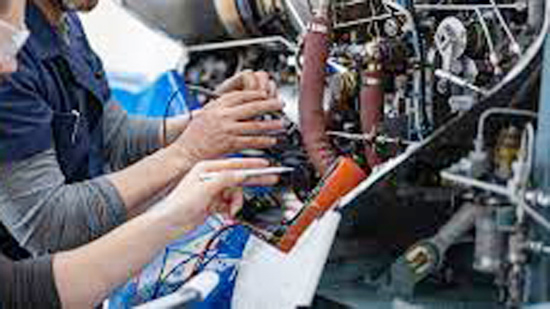Are you fascinated by the inner workings of machines and have a knack for problem-solving? If so, a career as a mechanical engineer might be the perfect fit for you. In this article, we will guide you on the path to becoming a successful mechanical engineer and help you understand the steps involved in this fulfilling and challenging profession.

Photo by iimr.indoreinstitute.com
Education and Qualifications Required to Become a Mechanical Engineer
To begin your journey towards becoming a mechanical engineer, you’ll need a strong foundation in science and mathematics. Obtaining a bachelor’s degree in mechanical engineering is typically the first step, although some positions may require a master’s degree or higher.
A bachelor’s degree program in mechanical engineering typically takes four years to complete and covers a wide range of subjects such as mathematics, physics, thermodynamics, fluid mechanics, materials science, and engineering design. These courses provide the fundamental knowledge and skills necessary for a career in mechanical engineering.
In addition to the core curriculum, many programs also offer specialized courses in areas such as robotics, automotive engineering, aerospace engineering, and renewable energy. These elective courses allow students to tailor their education to their specific interests and career goals.
Once you have completed your degree, you may also choose to pursue professional certifications to further enhance your qualifications. The American Society of Mechanical Engineers (ASME) offers a variety of certifications that demonstrate your expertise in specific areas of mechanical engineering.
While a bachelor’s degree is typically sufficient for entry-level positions, some employers may prefer candidates with a master’s degree or higher for more advanced roles or research positions. A master’s degree program in mechanical engineering typically takes an additional two years to complete and provides an opportunity to specialize in a specific area of interest.
Skills and Qualities Needed for a Successful Career in Mechanical Engineering
In addition to the educational qualifications, there are several skills and qualities that are essential for a successful career in mechanical engineering. These skills include:
Analytical and problem-solving skills: Mechanical engineers are tasked with solving complex problems and designing innovative solutions. Strong analytical and problem-solving skills are crucial for identifying issues, analyzing data, and developing effective solutions.
Technical knowledge: Mechanical engineers must have a deep understanding of the principles and concepts of mechanical engineering. This includes knowledge of mechanics, thermodynamics, fluid mechanics, materials science, and computer-aided design (CAD) software.
Creativity and innovation: Mechanical engineers often need to think outside the box to come up with creative and innovative solutions. The ability to think critically and approach problems from different angles is essential in this field.
Communication and teamwork: Mechanical engineers often work in teams and collaborate with professionals from other disciplines. Effective communication skills and the ability to work well in a team setting are important for successful project completion.
Attention to detail: Precision and accuracy are crucial in mechanical engineering. Paying close attention to detail ensures that designs and calculations are accurate and that projects are completed to the highest standards.
Continuous learning: Mechanical engineering is a constantly evolving field, with new technologies and techniques emerging all the time. The willingness to continuously learn and adapt to new advancements is key to staying relevant and thriving in this profession.
Job Prospects and Salary Expectations for Mechanical Engineers
Mechanical engineering is a dynamic field that offers a wide range of job prospects and opportunities for growth. Graduates with a degree in mechanical engineering can find employment in various industries, including aerospace, automotive, energy, manufacturing, and research and development.
According to the U.S. Bureau of Labor Statistics (BLS), the employment of mechanical engineers is projected to grow by 4% from 2019 to 2029, which is about as fast as the average for all occupations. This growth is driven by the need for mechanical engineers to design, develop, and improve machinery and mechanical systems.
In terms of salary expectations, the median annual wage for mechanical engineers was $88,430 as of May 2020, according to the BLS. Salaries can vary depending on factors such as experience, location, industry, and level of education. With the right qualifications and experience, mechanical engineers can earn a competitive salary and enjoy opportunities for career advancement.
Steps to Become a Mechanical Engineer
Becoming a mechanical engineer requires a series of steps, starting from high school all the way to obtaining the necessary qualifications and gaining practical experience. Here are the key steps involved:
Excel in science and mathematics
Mechanical engineering is a science-intensive field, so it’s important to excel in subjects such as physics, chemistry, and mathematics during high school. Building a strong foundation in these subjects will set you up for success in your future studies.
Research mechanical engineering programs
Look for accredited mechanical engineering programs offered by reputable universities or colleges. Consider factors such as curriculum, faculty, facilities, and opportunities for internships or co-op programs.
Apply and enroll in a mechanical engineering program
Once you have identified suitable programs, complete the application process and enroll in the program of your choice. Be sure to meet all the admission requirements, including submitting transcripts, test scores, and any additional application materials.
Complete the required coursework
During your mechanical engineering program, you will complete a combination of core and elective courses. Make sure to attend lectures, participate in laboratory sessions, and complete assignments to gain a thorough understanding of the subject matter.
Gain practical experience
Seek out internships, co-op programs, or research opportunities to gain hands-on experience in the field. This practical experience will not only enhance your skills but also make you more competitive in the job market.
Obtain professional certifications
Consider obtaining professional certifications offered by organizations such as ASME to enhance your qualifications and demonstrate your expertise in specific areas of mechanical engineering.
Explore career opportunities
Research and explore potential career opportunities in the field of mechanical engineering. Network with professionals in the industry, attend career fairs, and leverage online platforms to find job openings and internships.
Prepare and apply for jobs
Tailor your resume and cover letter to highlight your relevant skills and experience. Prepare for interviews by researching the company, practicing common interview questions, and showcasing your passion for mechanical engineering.
Continue learning and professional development
Stay up to date with the latest advancements in mechanical engineering by attending conferences, workshops, and seminars. Consider pursuing advanced degrees or specialized certifications to further enhance your skills and knowledge.
Choosing the Right Mechanical Engineering Program or College
Choosing the right mechanical engineering program or college is a crucial decision that will shape your future career. Here are some factors to consider when making this choice:
- Accreditation: Ensure that the program or college you choose is accredited by a recognized accrediting body. Accreditation ensures that the program meets certain standards of quality and rigor.
- Curriculum: Review the curriculum to ensure that it covers the core subjects and offers elective courses in your areas of interest. Look for programs that provide a balance between theory and practical application.
- Faculty: Research the qualifications and expertise of the faculty members in the mechanical engineering department. Experienced and knowledgeable faculty can provide valuable guidance and mentorship throughout your education.
- Facilities and resources: Consider the facilities and resources available to students, such as laboratories, research centers, and computer-aided design (CAD) software. These resources can enhance your learning experience and provide opportunities for hands-on practice.
- Internship and co-op programs: Check if the program offers internships or co-op programs that provide practical experience in real-world settings. These programs can help you apply your knowledge and gain valuable industry connections.
- Career services and alumni network: Look for programs that offer robust career services, including resume building, interview preparation, and job placement assistance. Additionally, consider the strength of the program’s alumni network, as alumni connections can provide valuable career opportunities.
Internship and Practical Experience Opportunities for Aspiring Mechanical Engineers
Gaining practical experience through internships and co-op programs is crucial for aspiring mechanical engineers. These opportunities provide hands-on experience and allow you to apply the knowledge gained in the classroom to real-world situations. Here’s how you can find internship and practical experience opportunities:
- Research companies and organizations: Identify companies and organizations in industries that align with your interests and career goals. Research their internship programs and application processes.
- Attend career fairs: Career fairs are excellent opportunities to meet representatives from companies and organizations offering internships. Come prepared with your resume and be ready to engage in conversations about your skills and aspirations.
- Leverage online platforms: Utilize online platforms such as LinkedIn, Indeed, and Glassdoor to search for internship opportunities. Set up job alerts and regularly check for new postings.
- Network: Network with professionals in the industry through events, conferences, and online communities. Attend industry-specific events and engage in conversations to learn about potential internship opportunities.
- Reach out to your college career services: Consult with your college’s career services department for guidance and assistance in finding internship opportunities. They often have connections with employers and can provide valuable resources.
Remember, internships are not only valuable for gaining practical experience but also for building connections and getting a foot in the door for future job opportunities. Treat your internship as a chance to showcase your skills, learn from experienced professionals, and make a positive impression.
Continuing Education and Professional Development in Mechanical Engineering
Continuing education and professional development are essential for staying current in the field of mechanical engineering and advancing your career. Here are a few ways to continue learning and growing:
Attend conferences and seminars
Conferences and seminars provide opportunities to learn about the latest advancements in mechanical engineering and connect with industry experts. Look for events that focus on your areas of interest and attend them regularly.
Pursue advanced degrees
Consider pursuing a master’s degree or a Ph.D. in mechanical engineering to specialize in a specific area or conduct research. Advanced degrees can open doors to more advanced roles and research opportunities.
Obtain specialized certifications
Explore specialized certifications offered by professional organizations such as ASME. These certifications can enhance your qualifications and demonstrate your expertise in specific areas of mechanical engineering.
Stay up to date with industry publications
Subscribe to industry publications, journals, and magazines to stay informed about the latest trends and developments in mechanical engineering. Regularly reading these publications can enhance your knowledge and keep you abreast of industry changes.
Join professional organizations
Joining professional organizations such as ASME can provide access to valuable resources, networking opportunities, and professional development programs. Take advantage of the resources and events offered by these organizations to expand your knowledge and skills.
The field of mechanical engineering is constantly evolving, and it’s important to stay curious, embrace lifelong learning, and adapt to new technologies and techniques.
Challenges and Rewards of a Career in Mechanical Engineering
While a career in mechanical engineering is rewarding, it also comes with its own set of challenges. Here are some common challenges faced by mechanical engineers:
Complex problem-solving
Mechanical engineers are often faced with complex problems that require innovative solutions. Finding the right solution can be challenging and may require extensive analysis, testing, and iteration.
Pressure and deadlines
Mechanical engineers often work on projects with strict deadlines and high stakes. Meeting project deadlines while ensuring quality and accuracy can be demanding and require effective time management and prioritization skills.
Continuous learning
Mechanical engineering is a rapidly evolving field, and staying up to date with the latest advancements and technologies can be challenging. Continuous learning and professional development are essential to keep pace with industry changes.
Collaboration and communication:
Mechanical engineers often work in teams and collaborate with professionals from other disciplines. Effective communication and collaboration skills are crucial for successful project completion.
Work-life balance
Like any demanding profession, achieving a healthy work-life balance can be a challenge for mechanical engineers. Balancing project demands, deadlines, and personal commitments requires effective time management and prioritization.
Despite these challenges, a career in mechanical engineering offers numerous rewards and opportunities for personal and professional growth. Some of the rewards include:
Innovation and creativity
Mechanical engineering allows you to apply your creativity and innovation to solve real-world problems. Designing new products, improving existing systems, and pushing the boundaries of technology can be highly rewarding.
Job satisfaction:
Seeing your ideas come to life and witnessing the impact of your work can be incredibly satisfying. Mechanical engineers often have the opportunity to work on projects that have a tangible and positive impact on society.
Versatile career paths
Mechanical engineering opens doors to a wide range of career paths and industries. From aerospace to automotive, from energy to manufacturing, there are numerous opportunities to explore and specialize in your area of interest.
Competitive compensation
Mechanical engineering offers a competitive salary and benefits package. With the right qualifications and experience, mechanical engineers can earn a comfortable income and enjoy opportunities for career advancement.
Job stability
Mechanical engineering is a field that is always in demand. The need for mechanical engineers to design, develop, and improve mechanical systems ensures a stable job market with ample career opportunities.
Future of Mechanical Engineering
As technology continues to advance and industries evolve, the future of mechanical engineering looks promising. From designing more efficient and sustainable systems to exploring new frontiers in robotics and automation, mechanical engineers will play a crucial role in shaping the future.
If you’re fascinated by the inner workings of machines, enjoy problem-solving, and have a passion for innovation, a career in mechanical engineering can provide a fulfilling and challenging professional journey. By obtaining the necessary education, gaining practical experience, and continuously learning and adapting to new advancements, you can become a successful mechanical engineer and contribute to the advancement of technology and society.




